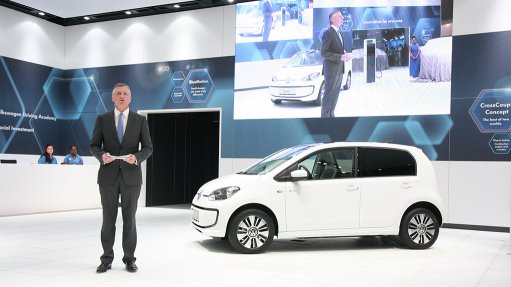
VWSA MD David Powels
Photo by: Duane Daws
Volkswagen Group South Africa (VWSA) will introduce the e-Golf in South Africa in 2014, as the German brand’s first full electric vehicle in the country, said VWSA MD David Powels on Wednesday.
He said VWSA will first test the vehicle’s acceptance and its practical use in the local market by means of a pilot programme, before introducing the vehicle to showrooms.
Powels said there were three considerations before VWSA could commercially introduce alternative-drive vehicles to South Africa. These were the availability of the vehicle in a right-hand drive version, sustainable customer demand, and the availability of enabling infrastructure to allow the effective use of the technology in South Africa.
VWSA also unveiled the Jetta hybrid, already in production, to media attending the Johannesburg International Motor Show, as well as the e-Up small electric city car, and the Golf 7 BlueMotion energy efficient model, which has a claimed fuel consumption of 3.2 ℓ/100 km.
The Cross Coupe is a high-performance concept sports-utility vehicle with a diesel engine and two electric motors, and a claimed fuel consumption of 1.8 ℓ/100 km. Top speed is 220 km/h.
NEW POLO
The Polo model was reaching the middle of its life cycle, with VWSA in discussion with its parent company to produce the successor model at its Uitenhage plant, in the Eastern Cape, confirmed Powels.
VWSA produced the current Polo model for the local and export markets.
Powels noted that recent labour turmoil, in the form of a seven-week strike in the automotive industry, was of concern to the company, but noted that Volkswagen had been producing vehicles in South Africa for six decades.
“We want to continue production in South Africa. We must use our energy and our leadership to try and create a more stable platform in South Africa so that we can convince our shareholder [Volkswagen in Germany] to again invest in the country.”